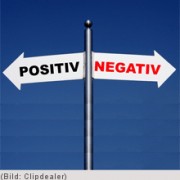If one partner in a relationship is HIV-positive and the other is negative, this raises questions for some couples. Peter Thomson* has known about his HIV infection for six years. Since then, his relationship life has changed quite a bit. In this article, he talks openly about his feelings and experiences.

The first time I heard the term "serodifferent relationship" was when I was at the Hassle Free Clinic in Toronto with my then new boyfriend. We wanted to learn about what to consider when one partner is HIV-positive and one is HIV-negative. I was in seventh heaven because an HIV-negative guy wanted to go with me despite my infection. I don't mean that sarcastically at all.
It felt great, so different from the hostility I had usually experienced in gay dating. More than ten times a day (seriously!) on Grindr, I was told I was "dirty", "unfuckable" or simply "creepy". Clearly, I was now in the land of milk and honey. At least that's what I thought. I had always been a staunch safer sex advocate and, with the few exceptions, I had always orientated myself to my own safety standards. I had nothing to do with the prejudiced practices that were used to get HIV. I'd never been repeatedly inseminated or injected with drugs, and I could count the times I'd been drunk on one hand. I just wasn't the type to get infected with HIV. A lot of people think like that.
"Just be grateful," I thought.
Back to my first boyfriend after the positive test result: he was handsome and interesting, but I fell more in love with him than was good for me. I had been so afraid that no one would ever touch me again. Since he did, he immediately became something of a best friend to me. The burden of my positive coming out catapulted us into a relationship virtually overnight. Poor bloke.
But although I had surrendered myself heart and soul, so to speak, the whole thing was much, much more complex: first of all, there was this very interesting dynamic that developed after the positive coming out to him, the negative partner. Even though I'm ashamed of it, I have to admit that I immediately put his health and well-being first. This is understandable to a certain extent, after all, I wanted my partner to stay negative. I said yes and amen to everything he suggested or wanted - where we went for dinner, what I did in bed and so on. Somehow I thought I should be happy that he bothered with me at all. "Just be grateful," I thought, "it's better than being alone." And: "After all, I'm the 'damaged' one in our relationship." I'm still ashamed of this to this day, of this thinking and this unshakeable sadness about being an idiot, an inferior member of the gay world.

One day the rubber broke when my boyfriend was fucking me. I'd never seen anyone panic like that. Everything we knew about the risks of transmission - and we had learnt a lot about it since my diagnosis - was suddenly gone. We held each other in our arms and cried. In a way, it brought us closer together, I had never experienced him so emotionally. In the long term, however, that was the wedge that drove us apart.
We called my doctor and decided together that the risk was negligible given my values. So there was no PEP, no immediate measure where HIV medication is taken for four weeks immediately after a suspected HIV transmission to prevent infection. And yet we were still very worried. When the whole thing happened again, my boyfriend literally fled the house and went straight to the emergency room. "We were lucky once," he said, "the second time was a sign." I don't know when we "officially" broke up, but when he started his PEP (post-exposure prophylaxis), our relationship evaporated. I didn't call him either.
"For a while, it was exciting to take risks."
My next relationship, over a year later, started very differently. My new boyfriend was older and didn't seem to be impressed by my infection at all. He didn't use a condom the first time we had sex. "Are you sure?" I asked him before he got down to business. His behaviour seemed to be enough of an answer. "Seemed to me" is the operative word here. After we'd finished, he said: "That was really cool. But we should have used a rubber."
I was devastated. A year earlier, I had resigned myself, for better or worse, to the fact that I might never be able to have sex without a condom again. For me, condoms were annoying contraceptives that you could throw overboard after three months of monogamy with a partner you trusted. Condoms were a barrier to trust, closeness and intimacy.

But this boy had just opened the door to a new model of sexuality - and then immediately slammed it shut again by trying to offload the responsibility for it onto me alone. He probably wasn't as cool with HIV as I had thought.
After we had been apart for a long time, he told me that the more he realised the reality of my HIV status, the more difficult it had become for him to imagine a relationship with me. "It was exciting to take risks for a while, but it couldn't go on forever," he said. I asked him about his test result. "Negative." Whew.
I realise more and more that my own condemnation of HIV-positive people drove me to seek out HIV-negative partners. I liked the idea that they were somehow untainted, untouched by the (emotional and physical) devastation that HIV brings.
I don't know who my next partner will be now that I've been HIV-positive for almost six years, but I hope that I see each potential candidate as I would want them to see me - first and foremost as a human being trying to navigate this complicated yet wonderful world.
*Name changed
The original was published in March 2014 under the title "Sero-Discordant Relationships: More Complex than Just Sex" on the blog ouragenda.ca. The author has chosen to remain anonymous. He chose the pseudonym Peter Thomson to avoid negative consequences for his social life, career and future travel opportunities. The text has been abridged. Translation: Holger Sweers









